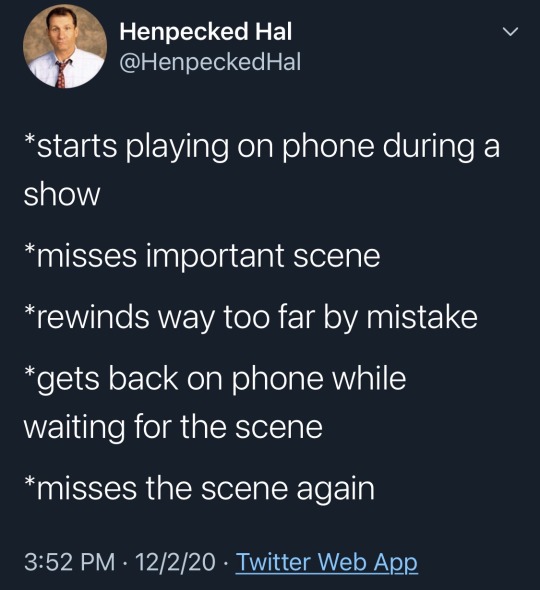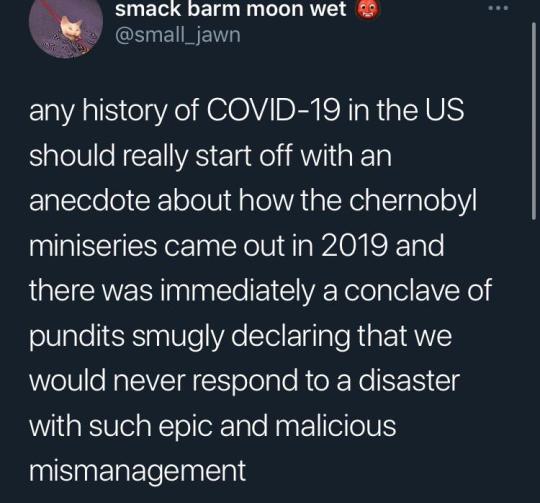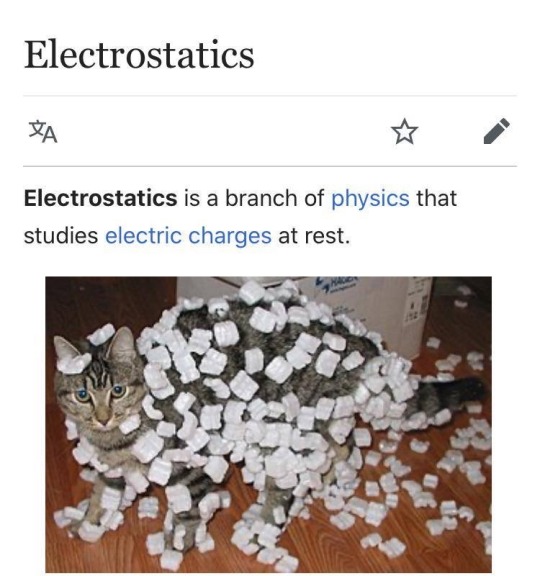Text
then clearly you understand that these laws are going to harm them as well, right?
right-wing fascists don’t give a shit if you’re “on their side” or not. they only care about lesbian/women’s issues insofar as how they can use them to spread fear and misinformation about anyone who isn’t perfectly aligned with western tradition. you are disposable to them.
more on this later but i have like eight drafts saved that all say a different version of “the reason I speak so much so often so openly about being an ex-radfem is because I see radfem spaces as arising from a Western moral panic about transness which in turn plays its part in a broader rise in conservative and right wing extremism, particularly in the United States, that is actively stealing our future from us and is only going to get worse and worse and worse. it’s not about having just changed my mind about some ideas.”
64 notes
·
View notes
Text
more on this later but i have like eight drafts saved that all say a different version of “the reason I speak so much so often so openly about being an ex-radfem is because I see radfem spaces as arising from a Western moral panic about transness which in turn plays its part in a broader rise in conservative and right wing extremism, particularly in the United States, that is actively stealing our future from us and is only going to get worse and worse and worse. it’s not about having just changed my mind about some ideas.”
#this is more or less how I feel about it#radfems showed their true colors by aligning with conservatives on trans issues instead of showing any sympathy for trans and GNC people#the entire LGBT community is threatened by these anti-trans laws
64 notes
·
View notes
Text
A Confession
Preface: I debated writing this for a long time. I debated posting it anywhere even more so. But I wanted to share my experience in case it was a helpful perspective for anyone else. Ultimately, that’s all this is – my perspective – but this is the internet, after all, so I’m expecting some people to willfully misinterpret this in bad faith. While I won’t be able to stop that, just acknowledge that this is a difficult conversation to have.
I haven’t used this Tumblr account regularly in over two years. To be honest, I almost forgot about it until I saw a screenshot of one of my older posts circulating on radfem twitter, which compelled me to finally sit down and write this.
It took a lot of soul searching and reflection to come to this conclusion, but after five years, I no longer identify as a radfem or align with radical feminism.
The last two years have irreparably changed people in countless ways. Whether it’s depression from the pandemic and mass death, (fear of) getting and spreading a novel infectious disease, losses of loved ones and friends, the subsequent economic fallout of lockdowns, and the grinding tolls of capitalism amid all these horrors – there’s not a single person on the planet who hasn’t been affected by covid.
It was the economic fallout and the tolls of capitalism that hit me particularly hard. I got laid off in March 2020 and didn’t find another job until this past May. I was unemployed for a while, but I couldn’t afford to live on unemployment payments alone, even while getting that bonus $300-$600 from the feds. I blew through nearly all my savings on rent, bills, and other living expenses.
As if my significant financial loss wasn’t bad enough, I began to feel extremely depressed and suicidal as a result of losing my job. I woke up each day feeling stuck, applying to any jobs I was remotely qualified for, even those I was underqualified for. I went through multiple rounds of interviews for a few different jobs and they either ghosted me or rejected me. It was hard not to take it personally. I distanced myself from college friends and former colleagues because I felt like such a disappointment for not pursuing a job in my field. But at the end of the day, I was still privileged enough to have money saved up.
More than anything, what I needed was a distraction. I needed to get out of my head. I live in a neighborhood that has a very high aging population, and at the start of the pandemic, I signed up to get involved in mutual aid efforts. Every week, I made grocery runs for a few of my neighbors and delivered them food, supplies, and other things.
It was certainly depressing work. A lot of people in my building died, and I grieved for them, although I didn’t really know many of them. Many lived alone in rent-controlled apartments and it pained me to think of them being alone during such a horrible time. But at the end of the day, knowing that I wasn’t wasting my time feeling sorry for myself, knowing that someone who was at high risk of getting sick with covid could still count on having their needs met, was enough for me. It was revitalizing. I got to meet some of the community organizers that I never knew were doing this incredible work. I felt grateful just to be a part of it because it was genuinely important work.
As I got involved in more community-focused efforts, one of the first things I noticed was that I worked alongside a decent amount of trans people. Initially, I reacted with caution. But after a few weeks, something clicked in me. I asked myself why I judged these people so harshly when (a) I barely even know them and (b) we’re mostly ideologically aligned and (c) the same goal unites us – to support the most vulnerable members of our community when others won’t bother.
After five years of only engaging with other lesbians and radfems, I had to recalibrate and decide whether radical feminism was still a force for good in my life. I thought for months. I wrote down all of my thoughts. At some point, I realized that radical feminism stopped being helpful and started being harmful. Some parts of it weren’t ever helpful for me, ever, at all.
In order to track the path I followed, I had to go back to the very beginning. I fell into radical feminism when I was 19. I was a sensitive, traumatized young woman (technically I identified as agender but who really cares). Freshman year, I was sexually assaulted at a party by a guy I vaguely knew from one class, who’d later start wearing nail polish and earrings and using they/them pronouns. I felt a confusing yet subtle rage as someone who I and others perceived as a “white cishet man” for the longest time suddenly claimed a queer identity similar to mine. That’s around the time I started trawling radfem blogs and finding myself covertly agreeing with everything. Eventually, I stopped lurking and made my own side blog.
It also didn’t help that as my thoughts got intrusively more terfy, many of my own friends started to ID as nonbinary or trans. Most of them were lesbians or bi women, but some were straight, as far as I knew. Not all of them pursued medical transition, but some did. By the end of college, I could count on one hand how many cis-IDed woman friends I had left.
Like many other women, I turned to radical feminism in an attempt to cope with trauma from male violence and grieve my female/lesbian friendships. Radfem spaces and rhetoric helped me understand what happened and why it all happened. It gave me the language to define my experiences and I'll be forever grateful for that. It was also important for me to come to terms with the fact that I’m always going to be classified as female; I learned to accept that and become comfortable moving through the world as a woman, no matter how I view myself.
However, as I got deeper into radical feminism, I built a filter bubble that constantly exposed me to accounts of male violence. It prolonged my own trauma response and made it harder to heal. Men are without a doubt dangerous, but I don't think it was healthy for me to feed into a fear that made it difficult to leave my apartment or interact with men on any level. The sense of constantly feeling under attack as a lesbian made me pull away from people who cared about me.
Seeing myself as someone who was “rescued” from a cult wasn't helpful or accurate, either. I found myself in radfem communities that fell into the same traps they harangue queer/trans communities for having: there was a clear figurehead(s) instead of a community dynamic. The need to have perfectly aligned beliefs outweighed the need to foster consciousness about different experiences and take coordinated action based on that, even if the feelings and motives around it are varied. Again, this resulted in me pulling away from some of my closest IRL friends. I viewed them as brainwashed simply for saying things like “trans women are women.”
I also don't think it was good to constantly engage in discussions about how insane or stupid trans and/or dysphoric people are. I developed the sense that trans people are somehow my enemies and they are actively trying to hurt me as a lesbian. I participated in an authoritarian approach to other dysphoric people pursuing transition or identifying as something other than their birth sex. I believed they were misguided and in need of saving from themselves. In hindsight, it was wrong of me to police others’ identities or assume I knew how to define their lives better than them.
It’s important to note the timeline of my peak radfem stage: 2017-2018, the peak of #MeToo. It felt for a second there that radfems might be on the precipice of some kind of big gender reckoning. In hindsight, it was a smokescreen. There was no momentum or structure to build an actual movement or anything, at least not in the way the trans community has clearly outlined its goals and strategies. We were headed nowhere.
I saw prominent radfems pissing away any credibility with unproductive discourse (i.e. arguing over gender-neutral pregnancy terms in the middle of the biggest global reckoning against anti-black racism in history), acting unnecessarily cruel and hurtful towards young trans people, particularly FTMs, aligning with right-wing racists over and over again, and generally having extremely narrow perspectives that don’t allow for multiple truths to exist simultaneously.
Being involved in community mutual aid efforts showed me what true solidarity looks like. It’s showing up for people who aren’t exactly like me on the premise that everyone deserves a good quality of life. I wasn’t just going to refuse to give someone their groceries because they were a Trump supporter – even if I disagree with them, they deserve to have food security, as everyone else should. No matter who they were, even if our beliefs were radically different, every person deserves to be safe, happy, and healthy in their life.
Considering that principle, I realized that negging trans people online isn’t activism. Insulting and mocking dysphoric people for transitioning isn’t activism. Nitpicking over language, slurs, and identity labels isn’t activism. Policing people’s experiences other than your own isn’t activism. Ninety-nine percent of the time, it’s just harassment.
I still have a lot of complicated feelings on gender identity, but honestly, it’s simply exhausting to direct my energy toward thinking about how mostly like-minded people are out to get me. Instead, I’ve found that I’d rather put that energy towards building bridges: now I actively engage in friendships with trans people, gradually make space for critical conversation, and accept that some points of ideological contention aren’t worth sacrificing so much of my community.
My trans teammates in mutual aid – mostly trans women and nonbinary folks – are wonderful, intelligent, and caring people who always kept their fingers on the pulse when it came to the community we served. I never would’ve gotten to know this if I always kept my distance as I did initially. And when I listened to them describe their personal experiences with gender, I didn’t feel as if my identity as a GNC lesbian was compromised, like I was always reactively afraid of, because it wasn’t my experience to define. I felt ashamed that I’d been closing myself off from years’ worth of friendships with an entire part of my community because I was so convinced that trans people were out to get me.
I know what some folks may be thinking while reading this: “Maybe you just buckled under the weight of reality. Maybe you’re backpedaling because you can’t stomach the truth of misogyny. Maybe you’re just too selfish to face the facts and stand up for women. You just want trans approval. You’re not a REAL feminist.”
Trust me, I’ve thought all those things enough myself, and I’ve reached a place where I know that’s not true. I can – and do – still actively support women everywhere in my life without identifying as a radfem. I took what was helpful from radical feminism, adopted it into my own life, and am trying to leave the rest behind. I think that questioning and reevaluating your beliefs, especially in times when your life has irrevocably changed, is a good thing that people should always do (and not just with radical feminism either).
Finally, and perhaps most importantly, I know that I’m not above blame for everything I’ve shared above. I'm not going to say I felt duped or brainwashed; I'm a grown woman. No matter how fucked up mentally I might have been at some points, I made my own decisions. I am responsible for what I’ve done and said, who I surround myself with, and how I respond to things. I said and did a lot of things I regret, which isn't anyone's fault other than my own.
I won’t be deleting this account, but I will be retiring it. I’ll leave this essay up in case anyone else questioning their politics finds it helpful, or if anyone has questions or wants to chat. At this point, I’d rather build bridges than burn them. The biggest lesson I’ve learned from this: if the revolution isn’t tomorrow, always choose friendship and happiness at the end of the day.
132 notes
·
View notes
Text
tumblr will always be a better website than twitter because you can only retweet a tweet once, whereas on this website if i really like a post i can make my followers scroll past it twelve times in a row
229K notes
·
View notes
Text
“That another lesbian realized what I go through can keep me centered and sane. I do not have to remain in the craziness of isolation, believing that no one realizes what is happening to me. I am not isolated. I am a part of a group and recognized; I am being taken seriously; I make a difference.” Lesbian Ethics, Sarah Hoagland
299 notes
·
View notes
Text
This is absolutely not a rare opinion I’m sure but the idea of professionalism is SO STUPID! And so completely arbitrary! I hate that it’s even a thing considering “professional” means like, absolutely nothing when you actually think about it. What exactly makes colored hair unprofessional? That it’s “unnatural”? So is makeup! So is WOMEN SHAVING but not only is that not unprofessional, it’s EXPECTED. What makes jeans unprofessional but slacks professional? What is the DIFFERENCE. Give me one quantitative way to tell what is unprofessional and what isn’t. I entirely think it’s just due to the association it has with certain groups of people. It all comes down to classism, or racism, or homophobia, or just otherwise hating anyone who stands out, and that’s ridiculous! We’re taught professionalism is like, SO essential. It’s ingrained into us basically from elementary school on, and why??? I refuse.
370 notes
·
View notes
Photo

Luke, 43
“My jacket and shorts are Balenciaga, sweater from Flaming Saddles, boots by Bottega Veneta, and the hat is a Mexican cowboy hat. My style philosophy is don’t be too philosophical about it. My style today is Mexican cowboy in 80’s NYC.”
Feb 11, 2020 ∙ Hell’s Kitchen
2K notes
·
View notes











